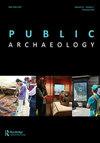Indigenous Science for a World in Crisis
IF 0.9
4区 历史学
0 ARCHAEOLOGY
引用次数: 13
Abstract
A growing body of work illustrates that community-based archaeology can contribute in valuable and meaningful ways to communities, including helping individuals and groups to heal from historical trauma. Yet the current political climate makes it challenging, even dangerous at times, to engage in such work. In what is being called the ‘post-truth’ era, there is concern that science is under attack, and I argue that the threat is heightened for Indigenous science. For Indigenous communities and archaeologists, efforts to work in partnership to bring Indigenous perspectives into public view can make one a target for bullying, aggression, and hostility. This can be damaging and have serious negative repercussions including producing further trauma for communities and individuals. Drawing on Indigenous epistemologies, I propose a model of ‘braiding knowledge’ to create space for multiple ways of knowing that complement each other, arguing that such symbiosis is necessary for our contemporary forms of knowledge production, particularly in the current political climate. I provide the example of Archibald’s approach to ‘Indigenous storywork’ as one method for archaeologists to explore, presenting examples drawn from research and teaching contexts to demonstrate the potential of arts-based research methods, such as graphic narratives, augmented reality, and animation. I propose these methods of storywork as worthy of further exploration by archaeologists in the current divisive political climate and as we face a world in crisis as one way of increasing science literacy. I argue that they have the capacity to ‘mobilize knowledge’, allowing archaeologists to reach diverse groups, creating space for knowledge exchange and connecting across differences.危机中的世界的本土科学
越来越多的工作表明,以社区为基础的考古学可以以有价值和有意义的方式为社区做出贡献,包括帮助个人和团体从历史创伤中恢复过来。然而,当前的政治气候使得从事此类工作具有挑战性,有时甚至是危险的。在所谓的“后真相”时代,人们担心科学受到攻击,我认为本土科学面临的威胁更加严重。对于土著社区和考古学家来说,合作努力将土著观点带入公众视野可能会使他们成为欺凌、侵略和敌意的目标。这可能具有破坏性,并产生严重的负面影响,包括对社区和个人造成进一步的创伤。根据土著认识论,我提出了一个“编织知识”的模型,为多种相互补充的认识方式创造空间,认为这种共生对于我们当代的知识生产形式是必要的,特别是在当前的政治气候下。我以阿奇博尔德的“土著故事作品”方法为例,作为考古学家探索的一种方法,并从研究和教学环境中提出了一些例子,以展示基于艺术的研究方法的潜力,如图形叙事、增强现实和动画。我认为这些故事创作的方法值得考古学家在当前分裂的政治气候下进一步探索,因为我们面临着一个危机中的世界,作为提高科学素养的一种方式。我认为它们具有“调动知识”的能力,使考古学家能够接触到不同的群体,为知识交流和跨越差异创造空间。
本文章由计算机程序翻译,如有差异,请以英文原文为准。
求助全文
约1分钟内获得全文
求助全文

 求助内容:
求助内容: 应助结果提醒方式:
应助结果提醒方式:


